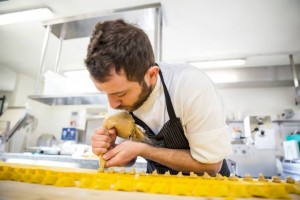FEATURES The Global History of Jewish Food
It is well known that food has a great importance in Italian culture. At least as much as it has in Jewish culture. And the only Italian University where all courses and subjects have to do with food is the promoter of an international seminar about Jewish Food. Professor Simone Cimotto, an expert in America History whose interests include Migration History and Food History, has used his extensive experience in American Universities to organize “The Global History of Jewish Food”, that will take place on the 9th and 10th of June at the University of Gastronomic Sciences, in Pollenzo, Piedmont.
The University, founded in 2004 by the international non-profit organization Slow Food, in cooperation with two Italian regions (Piedmont and Emilia-Romagna), is a ministerially recognized, private non-profit institution. Its goal is to create an international research and education centre for those working on renewing farming methods, protecting biodiversity, and building an organic relationship between gastronomy and agricultural science. So its laureate, the “Gastronomes”, hailing from all over the world, are a new professional figure, with many skills.
Professor Cinotto is the coordinator of one of the four master programs in Food Culture and Communication and to the courses taught in “Food, Place and Identity” he has added this year a seminar by Hasia Diner, professor of History and Hebrew and Judaic Studies at New York University.
And the two together have organized the international conference “The Global History of Jewish Food”, a two-day conversation on the history of food, to be explored from the point of view of the long and geographically wide scope of Jewish history. The focus will particularly be on moments of change, both positive and negative, including but not limited to migration, dispersion, war, and the formation of new Jewish communities. How did Jews cope, from the standpoint of their foodways, with the dislocations that spanned centuries and traversed the globe? How, in these global journeys, did they engage with the foods of the peoples around them?
The President of UNISG and the Slow Food Association Carlo Petrini will open the conference. After the talks of two Italian Jewish cultural public figures, the works will be divided into three sessions. From: “Eating Across the Jewish-non-Jewish Divide” and “Embracing Novelty/Yearning for the Familiar” on Monday to “Jewish Food Fights” on Tuesday.
For information: www.unisg.it/eventi/jews-eat-global-history-jewish-food/www.unisg.it

